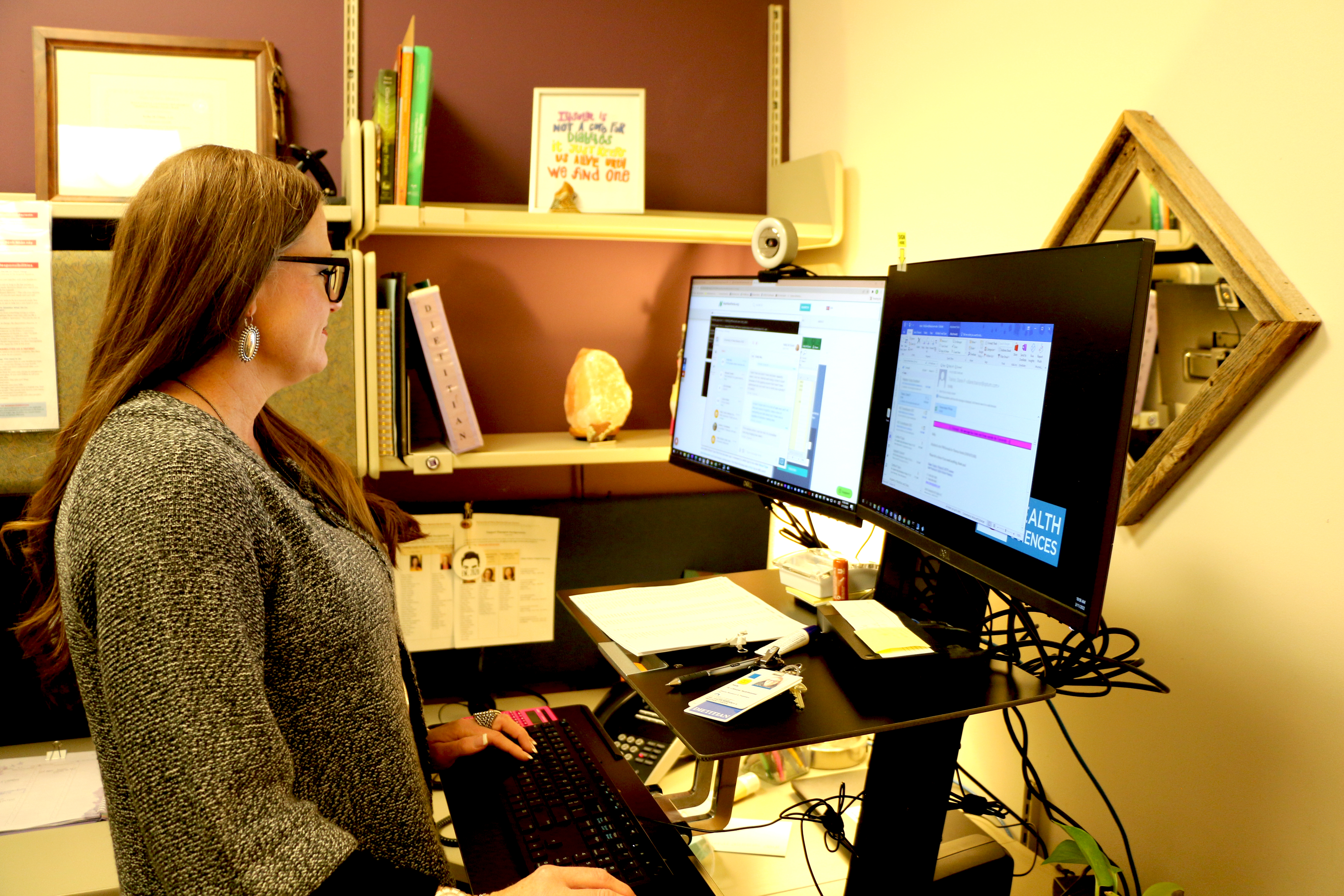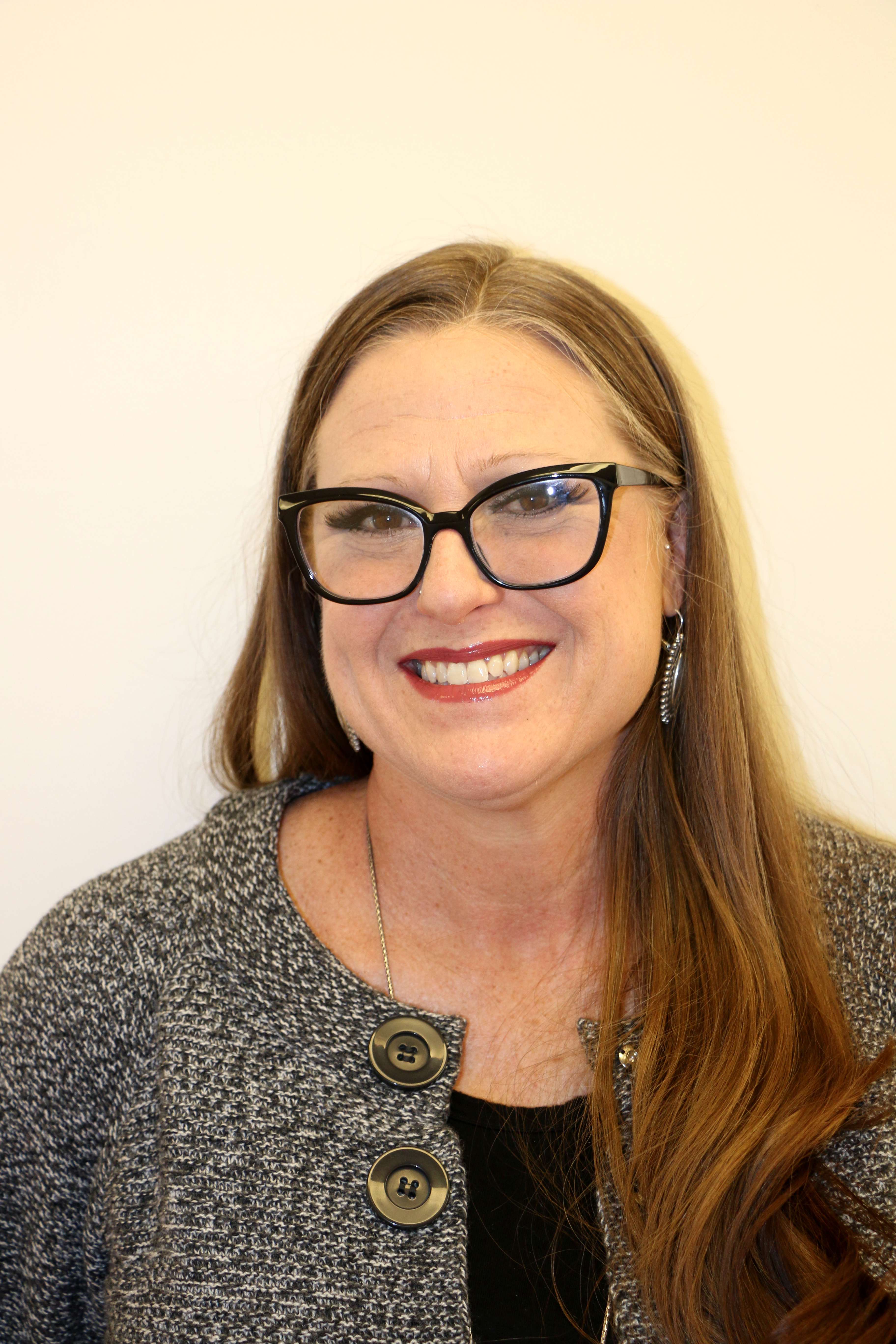 There’s an old adage that food is medicine.
There’s an old adage that food is medicine.
For The University of New Mexico Comprehensive Cancer Center, food is a crucial part of a patient’s journey from diagnosis, through treatment and beyond.
The UNM Comprehensive Cancer Center employs two dietitians, experts who provide patients with consultation, recommendations and sometimes even orders, to ensure the best nutrition possible as they face the challenge of fighting cancer.
“If I was going to explain it to a patient, I would say that you don’t need to search online to answer your nutrition questions,” said UNM Cancer Center dietitian Kelly Dunn, RDN, CSO, CNSC, LD. “I’m going to answer your questions because I am trained to do it.”
Dunn recently became board certified by the Academy of Nutrition and Dietetics in Oncology Nutrition. She is currently the only board-certified oncology nutrition specialist in New Mexico and is among the first in the state to receive such a designation.
Getting a certification in oncology requires 2,000 hours of internship and successful board examination.
That is in addition to what it takes to become a registered dietitian, which requires a bachelor’s degree, followed by 1,000 hours in a credentialed internship, along with successfully passing the national registration exam.
Dunn said the training that dietitians receive falls into five categories:
- Management
- Food Service
- Community (such as WIC, a senior center or Head Start)
- Clinical
- Research
Most dietitians, including Dunn, find their first jobs in clinical settings, particularly hospitals. But Dunn said she was attracted to oncology, particularly at a cancer center, because it allowed her to extend her practice beyond the four walls of a clinic.
Continued Care
Dunn completed all of her education, as well as much of her early career, in Texas, but she had been eyeing UNM Cancer Center for a number of reasons. Offering outpatient services was a big part of that, along with the fact that nutritional service is a part of the UNM Cancer Center’s team approach, and not an additional billable service.
“I found an inpatient hospital position where I could work with oncology patients while they were in the hospital,” she said. “That was difficult, because they’re in the hospital when they’re at their sickest. I got them through their illness and helped them with discharge and their education, but I didn’t get to be involved in their care long-term. I didn’t get to help them once they were not acutely ill anymore.
“I already knew by that time I wanted to be in oncology. I knew (UNM Cancer Center) was the place, because they would for sure always offer outpatient dietitian services.”
Dunn said that, in her experience, finding dietitians at a cancer center is rare. The fact that the UNM Cancer Center employs two shows the center’s commitment to including nutrition as part of a patient’s overall care.
Dunn works in concert with the UNM Cancer Center’s treatment teams. She begins her approach with an extensive interview with the patient.
“Part of the initial consult is information-seeking, so I let them know I have quite a few questions,” Dunn said. “That’s why I like to meet with them as early as I can. That way I can get a baseline of how they’ve been prior to and at the time of diagnosis.”
The questions don’t just dwell on food.
Dunn asks about their usual body weight, if they’ve encountered any recent unusual weight loss, how are they chewing and swallowing, and about their bowels. Then she asks about diet: what types of food they eat and how often. It’s crucial information in order to see if a patient is even meeting their caloric and protein needs, she said.
All of that information goes into creating a tailored plan for each of her patients.
“Keeping them nourished, maintaining their muscle mass and getting adequate protein can help reduce the side effects of all the treatment they are getting, which helps ensure they don’t have to miss a treatment or have doses reduced.
“They get the entire treatment as planned to have the best outcome. Or, after they finish their treatment and next need to be ready for surgery, we can ensure they are well-nourished and prepared to undergo a major surgery.”
Small Changes
The lack of time afforded to many New Mexicans poses a challenge to their diets, Dunn said.
“Individuals and families are grabbing quick to-go or drive-thru meals just to eat,” she said. “I don’t tackle it from a perspective of, ‘You have to stop it right now.’ I’m a realist, so I tackle it from the perspective of, ‘We have to figure out where you can go and what you can order so you’re making the healthiest choices possible.’ Then we talk about the menu and what they might order and what we might change about that.”

© istock by Getty Images
Change comes in incremental steps, Dunn said.
“Healthy eating is not a diet or a fad, so making slow changes one at a time is going to be the best way to implement a lifestyle that can become their everyday and just the way they live, versus this is something they were told to do,” Dunn said.
Lack of financial resources can also pose a challenge to some patients.
Understanding a patient’s limitations is also part of her screening process, Dunn said. Knowing how much they eat, what they eat, where they purchase their food and who prepares the food all go into a patient’s individual nutrition plan.
Sometimes the conversation expands to what community resources are available to patients, whether it be free grocery pickup or meal delivery services such as Meals on Wheels.
“We troubleshoot these challenges with the patients,” Dunn said. “Rather than me just saying, ‘You’re kind of up a creek,’ we strategize on the things we can do.”
Research Possibilities
While Dunn’s patient load can number in the thousands, she also is working to find ways to get involved in research.
She received her undergraduate degree from Baylor University and maintains contacts there. She said she is working with one of the researchers there who is looking into the effects of nutrition on the patients’ microbiome.
“I’m the only clinical, feet-on-the-floor dietitian she has who’s interacting with patients,” she said.
The initial publication will be a research review that printed in the Neoplasia Journal. The research team will then conduct a study looking at the dietary impact on the microbiome during cancer treatment for publication in oncology journals.
Because Dunn works so closely with the UNM Cancer Center’s surgical team, she has also presented potential study ideas about how malnutrition affects surgery.
“I’ve started working closely with the Preanasthesia Clinic and have presented a couple of ideas looking back and looking forward on nutrition status and surgical outcomes,” she said.
Hope
Dunn also makes regular presentations to providers within the UNM Cancer Center to educate and remind them of the important role a dietitian can play in the broader continuum of care.
A cancer diagnosis is frightening. Especially at first, the information about procedures and treatments is unintentionally bewildering and out of the patients’ control.
Dietary information, she said, can be a calming source of control.
“When patients are here and they’re feeling at their worst, we can give them hope,” she said. “We give them hope because we give them additional strategies to help with the symptoms they might be experiencing. We can talk about overcoming side effects and the impacts of symptoms and how to feel better without talking about every single system in their body.”
UNM Comprehensive Cancer Center
The University of New Mexico Comprehensive Cancer Center is the Official Cancer Center of New Mexico and the only National Cancer Institute-designated Cancer Center in a 500-mile radius.
Its more than 136 board-certified oncology specialty physicians include cancer surgeons in every specialty (abdominal, thoracic, bone and soft tissue, neurosurgery, genitourinary, gynecology, and head and neck cancers), adult and pediatric hematologists/medical oncologists, gynecologic oncologists, and radiation oncologists. They, along with more than 600 other cancer healthcare professionals (nurses, pharmacists, nutritionists, navigators, psychologists and social workers), provide treatment to 65% of New Mexico’s cancer patients from all across the state and partner with community health systems statewide to provide cancer care closer to home. They treated almost 15,000 patients in more than 100,000 ambulatory clinic visits in addition to in-patient hospitalizations at UNM Hospital.
A total of nearly 1,855 patients participated in cancer clinical trials testing new cancer treatments that include tests of novel cancer prevention strategies and cancer genome sequencing.
The more than 123 cancer research scientists affiliated with the UNMCCC were awarded $38.2 million in federal and private grants and contracts for cancer research projects. Since 2015, they have published nearly 1000 manuscripts, and promoting economic development, they filed 136 new patents and launched 10 new biotechnology start-up companies.
Finally, the physicians, scientists and staff have provided education and training experiences to more than 500 high school, undergraduate, graduate, and postdoctoral fellowship students in cancer research and cancer health care delivery.
